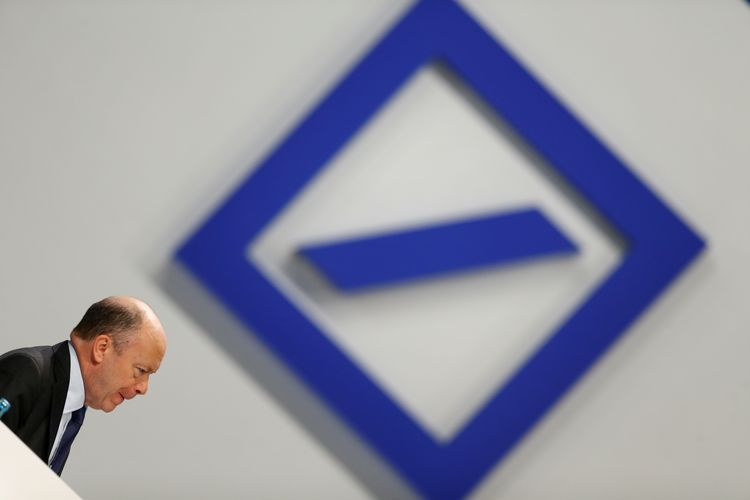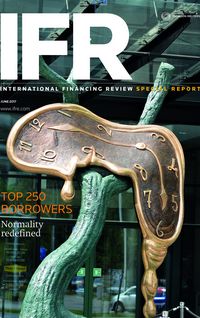After a tough year that involved a rating downgrade, a restructuring and numerous tussles with the US Department of Justice, Deutsche Bank is getting its house in order.
It has been a tough year for Deutsche Bank. On the one hand, it posted a loss of €1.4bn for 2016, thanks to restructuring and the need to put together a significant legal provision war chest to fight numerous US Department of Justice inquiries. But perhaps the blow that hurt the most was the one-notch rating downgrade by Moody’s to Baa2
That resulted in a savage 80% cut to the bank’s bonus pool, headcount reduction and changes at the top, with two new deputy CEOs named: former CFO Marcus Schenck and Christian Sewing, who looks after wealth management and consumer banking.
“After the difficult restructuring of recent years, the supervisory board is convinced that these strategic, financial and personnel measures provide a firm foundation for sustainable growth,” said Paul Achleitner, chairman of the supervisory board, earlier this year.
Now reorganised into three units of corporate and investment banking, wealth management and asset management, the outlook is brighter.
“2017 is another year of restructuring even though in a better outlook,” said Deutsche’s chief executive officer, John Cryan, at the bank’s annual general meeting in Frankfurt at the end of May. “We see better revenue opportunities, thanks additionally to a modest economic recovery in Europe and a modest US economy.”
At the beginning of April, the bank unveiled a turnaround plan that would aim at what Cryan called “prudent growth” in an letter to employees. This involved the integration of its Postbank subsidiary, a €8bn capital raising – the bank’s fifth in a decade – the sale of assets and the floatation of a minority stake in its asset management business on the stock exchange to earn an extra €2bn.
Many of the bank’s most obvious problems come from its retail Postbank subsidiary, which has been hanging around like an embarrassing relative at a wedding. A significant amount of the equity funds raised will go towards reintegrating the business. It does not help that Cryan had promised to sell the bank when he took over in 2015 but felt that the offers that were made were too low. Since then, the bill for preparation to divest and now preparation to integrate is standing at around €2.5bn. But with a concrete plan now under way, concerns have abated.
Despite some complaints about dilution, the €8bn capital raising, with a consortium of Credit Suisse, Barclays, Goldman Sachs, BNP Paribas, Commerzbank, HSBC, Morgan Stanley and UniCredit, was a success. In many ways, there was no doubt that it would be. It was underwritten at €11.65 a share - a hefty 39% discount to the bank’s closing price the day before the announcement.
“Thanks to a stronger balance sheet, we have the ability to increase business,” Cryan said in his letter. “We will be able to grow again in a more focused way.”
The equity raise has helped strengthen the bank’s balance sheet. Its Common Equity Tier 1 ratio has risen from 11.8% to 14.1% on a fully loaded basis, and more to the point is likely to remain above 13% for the rest of the year. This puts it comfortably above the European Central Bank’s Supervisory Review and Evaluation Process guidance of 13%. And although some eyebrows remain raised that the bank’s leverage ratio of 4% is below a targeted 4.5%, the sale of assets and flotation of Deutsche Bank Asset Management should fix that.
Secondary recovery
The ease and smoothness of the capital raising helped the performance of the bank’s bonds in the secondary market, especially its riskiest paper – the Additional Tier 1s. Deutsche Bank’s US$1.25bn 6.25% non-call 2020 and €1.75bn 6% non-call 2022 AT1s had both fallen to around 70 cents last year, but are now at cash prices of 96 and 97 cents, respectively.
The bank’s bonds were an elephant in the room and had been hugely impacted by its legal woes. They came under pressure in September last year after the US Department of Justice sought as much as US$14bn in a settlement related to the bank’s (mis)selling of mortgage-backed securities. The sheer size of the fine had set off alarm bells that Deutsche Bank would not have set enough cash aside to pay, and there was a sell-off.
“The ability of issuers to service AT1 coupons will remain a central risk that ideally should be quantified,” warned Morgan Stanley analysts Greg Case and Jackie Ineke in a research note at they ranked Deutsche last out of 26 European banks.
By December, the bank had agreed a US$7.2bn settlement – a civil monetary penalty of US$3.1bn and US$4.1bn for consumer relief. “The negative news flow around the DoJ RMBS settlement in October 2016 adversely impacted revenues,” the bank admitted.
A sign of how much of a worry this was to the board is that in March the bank made a point of confirming that AT1 coupon payments for this year had been approved.
But this is not an end to the bank’s legacy legal worries. In early June, it paid a fine of US$41m to settle US Federal Reserve allegations that it had failed to comply with the Bank Secrecy Act in the US over money laundering between 2011 and 2015. Deutsche Bank still faces a number of investigations, including into whether it manipulated foreign currency rates and precious metals prices, but with a legal provision chest that stood at €3.2bn at the end of March, none is likely to cause great upset.
Indeed, there are signs that Deutsche Bank might have turned the corner.
Although the bank’s debt trading arm showed only an 11% rise in revenues to €2.29bn and well below that of its peers, it is still too early to make a call. Over the past 12 months, its shares are up 15.4%, off a distinct low of €8.83 per share at the end of September. But, more significantly, the bank is hiring again.
At the beginning of June, it said it was planning to hire 50 client-facing positions in the second half of the year in its Asian wealth management business. The bank’s willingness to invest in extra headcount again shows that Deutsche Bank is prepared for growth.




